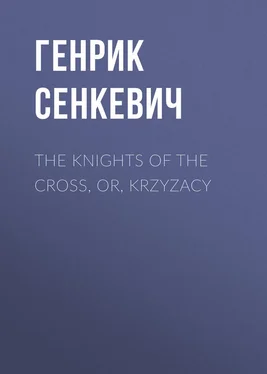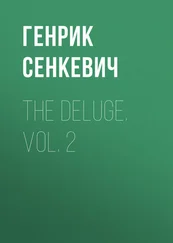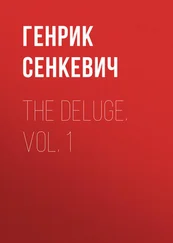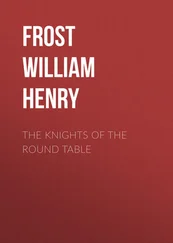Генрик Сенкевич - The Knights of the Cross, or, Krzyzacy
Здесь есть возможность читать онлайн «Генрик Сенкевич - The Knights of the Cross, or, Krzyzacy» — ознакомительный отрывок электронной книги совершенно бесплатно, а после прочтения отрывка купить полную версию. В некоторых случаях можно слушать аудио, скачать через торрент в формате fb2 и присутствует краткое содержание. Жанр: foreign_antique, foreign_prose, на английском языке. Описание произведения, (предисловие) а так же отзывы посетителей доступны на портале библиотеки ЛибКат.
- Название:The Knights of the Cross, or, Krzyzacy
- Автор:
- Жанр:
- Год:неизвестен
- ISBN:нет данных
- Рейтинг книги:4 / 5. Голосов: 1
-
Избранное:Добавить в избранное
- Отзывы:
-
Ваша оценка:
- 80
- 1
- 2
- 3
- 4
- 5
The Knights of the Cross, or, Krzyzacy: краткое содержание, описание и аннотация
Предлагаем к чтению аннотацию, описание, краткое содержание или предисловие (зависит от того, что написал сам автор книги «The Knights of the Cross, or, Krzyzacy»). Если вы не нашли необходимую информацию о книге — напишите в комментариях, мы постараемся отыскать её.
The Knights of the Cross, or, Krzyzacy — читать онлайн ознакомительный отрывок
Ниже представлен текст книги, разбитый по страницам. Система сохранения места последней прочитанной страницы, позволяет с удобством читать онлайн бесплатно книгу «The Knights of the Cross, or, Krzyzacy», без необходимости каждый раз заново искать на чём Вы остановились. Поставьте закладку, и сможете в любой момент перейти на страницу, на которой закончили чтение.
Интервал:
Закладка:
Henryk Sienkiewicz
The Knights of the Cross, or, Krzyzacy: Historical Romance
To the Reader
Here you have, gentle reader – old writers always called you gentle – something very much more than a novel to amuse an idle hour. To read it will be enjoyable pastime, no doubt; but the brilliant romance of the brilliant author calls upon you for some exercise of the finest sympathy and intelligence; sympathy for a glorious nation which, with only one exception, has suffered beyond all other nations; intelligence, of the sources of that unspeakable and immeasurable love and of the great things that may yet befall before those woes are atoned for and due punishment for them meted out to their guilty authors.
Poland! Poland! The very name carries with it sighings and groanings, nation-murder, brilliance, beauty, patriotism, splendors, self-sacrifice through generations of gallant men and exquisite women; indomitable endurance of bands of noble people carrying through world-wide exile the sacred fire of wrath against the oppressor, and uttering in every clime a cry of appeal to Humanity to rescue Poland.
It was indeed a terrible moment in history, when the three military monarchies of Europe, Russia, Austria and Prussia, swooped down upon the glorious but unhappy country, torn by internal trouble, and determined to kill it and divide up its dominions. All were alike guilty, as far as motive went. But Holy Russia – Holy! – since that horrible time has taken upon herself by far the greatest burden of political crime in her dealings with that noble nation. Every evil passion bred of despotism, of theological hatred, of rancorous ancient enmities, and the ghastliest official corruption, have combined in Russian action for more than one hundred and fifty years, to turn Poland into a hell on earth. Her very language was proscribed.
This is not the place to give details of that unhappy country's woes. But suffice it to say, that Poland, in spite of fatuous prohibitions, has had a great literature since the loss of her independence, and that literature has so kept alive the soul of the nation, that with justice Poland sings her great patriotic song:
"Poland is not yet lost
As long as we live…"
The nation is still alive in its writers and their works, their splendid poetry and prose.
It is a pity that so few of these great writers are widely known. But most people have heard of Jan Kochanowski, of Mikolaj Rey, of Rubinski, of Szymanowicz, of Poland's great genius in this century, one of the supreme poets of the world, Adam Mickiewicz, of Joseph Ignac, of Kraszewski, who is as prolific in literary and scientific works as Alexander von Humboldt, and of hundreds of others in all branches of science and art, too numerous to mention here.
And it is remarkable that the author of this book, Henryk Sienkiewicz, should of late have attained such prominence in the public eye and found a place in the heart of mankind. It is of good omen. Thus, Poland, in spite of her fetters, is keeping step in the very van of the most progressive nations.
The romance of Sienkiewicz in this volume is perhaps the most interesting and fascinating he has yet produced. It is in the very first rank of imaginative and historical romance. The time and scene of the noble story are laid in the middle ages during the conquest of Pagan Lithuania by the military and priestly order of the "Krzyzacy" Knights of the Cross. And the story exhibits with splendid force the collision of race passions and fierce, violent individualities which accompanied that struggle. Those who read it will, in addition to their thrilling interest in the tragical and varied incidents, gain no little insight into the origin and working of the inextinguishable race hatred between Teuton and Slav. It was an unfortunate thing surely, that the conversion of the heathen Lithuanians and Zmudzians was committed so largely to that curious variety of the missionary, the armed knight, banded in brotherhood, sacred and military. To say the least, his sword was a weapon dangerous to his evangelizing purpose. He was always in doubt whether to present to the heathen the one end of it, as a cross for adoration, or the other, as a point to kill with . And so, if Poland was made a Catholic nation, she was also made an undying and unalterable hater of the German, the Teutonic name and person.
And so this noble, historical tale, surpassed perhaps by none in literature, is commended to the thoughtful attention and appreciation of the reader.
SAMUEL A. BINION.NEW YORK, May 9, 1899.
PART FIRST
CHAPTER I
In Tyniec,[1] in the inn under "Dreadful Urus," which belonged to the abbey, a few people were sitting, listening to the talk of a military man who had come from afar, and was telling them of the adventures which he had experienced during the war and his journey.
He had a large beard but he was not yet old, and he was almost gigantic but thin, with broad shoulders; he wore his hair in a net ornamented with beads; he was dressed in a leather jacket, which was marked by the cuirass, and he wore a belt composed of brass buckles; in the belt he had a knife in a horn scabbard, and at his side a short traveling sword.
Near by him at the table, was sitting a youth with long hair and joyful look, evidently his comrade, or perhaps a shield-bearer, because he also was dressed as for a journey in a similar leather jacket. The rest of the company was composed of two noblemen from the vicinity of Krakow and of three townsmen with red folding caps, the thin tops of which were hanging down their sides to their elbows.
The host, a German, dressed in a faded cowl with large, white collar, was pouring beer for them from a bucket into earthen mugs, and in the meanwhile he was listening with great curiosity to the military adventures.
The burghers were listening with still greater curiosity. In these times, the hatred, which during the time of King Lokietek had separated the city and the knighthood, had been very much quenched, and the burghers were prouder than in the following centuries. They called them still des allerdurchluchtigsten Kuniges und Herren and they appreciated their readiness ad concessionem pecuniarum ; therefore one would very often see in the inns, the merchants drinking with the noblemen like brothers. They were even welcome, because having plenty of money, usually they paid for those who had coats of arms.
Therefore they were sitting there and talking, from time to time winking at the host to fill up the mugs.
"Noble knight, you have seen a good piece of the world!" said one of the merchants.
"Not many of those who are now coming to Krakow from all parts, have seen as much," answered the knight.
"There will be plenty of them," said the merchant. "There is to be a great feast and great pleasure for the king and the queen! The king has ordered the queen's chamber to be upholstered with golden brocade, embroidered with pearls, and a canopy of the same material over her. There will be such entertainments and tournaments, as the world has never seen before."
"Uncle Gamroth, don't interrupt the knight," said the second merchant.
"Friend Eyertreter, I am not interrupting; only I think that he also will be glad to know about what they are talking, because I am sure he is going to Krakow. We cannot return to the city to-day at any rate, because they will shut the gates."
"And you speak twenty words, in reply to one. You are growing old, Uncle Gamroth!"
"But I can carry a whole piece of wet broadcloth just the same."
"Great thing! the cloth through which one can see, as through a sieve."
But further dispute was stopped by the knight, who said:
Читать дальшеИнтервал:
Закладка:
Похожие книги на «The Knights of the Cross, or, Krzyzacy»
Представляем Вашему вниманию похожие книги на «The Knights of the Cross, or, Krzyzacy» списком для выбора. Мы отобрали схожую по названию и смыслу литературу в надежде предоставить читателям больше вариантов отыскать новые, интересные, ещё непрочитанные произведения.
Обсуждение, отзывы о книге «The Knights of the Cross, or, Krzyzacy» и просто собственные мнения читателей. Оставьте ваши комментарии, напишите, что Вы думаете о произведении, его смысле или главных героях. Укажите что конкретно понравилось, а что нет, и почему Вы так считаете.












